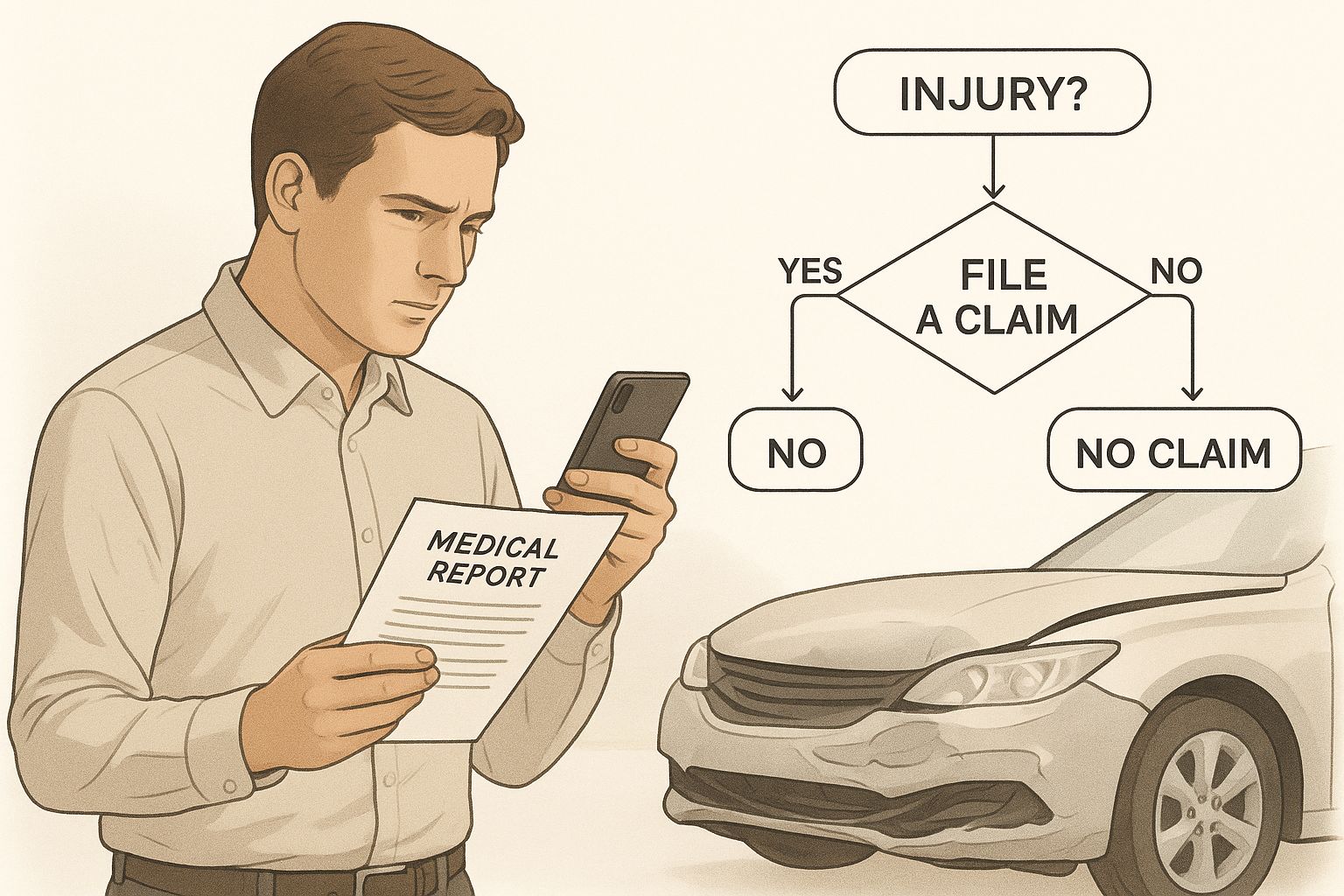When to Hire a Personal Injury Attorney in Oregon
"I was satisfied once John Bell took over my case."
"Communication was always timely."
When to Hire a Personal Injury Attorney in Oregon
If there's one single moment when you absolutely should hire a personal injury attorney, it's this: you've been seriously hurt because of someone else's mistake, and now an insurance company is involved. If your injuries are more than just minor bumps and bruises, getting a lawyer on your side right away is the smartest move you can make to protect your rights.
Key Moments to Hire a Personal Injury Attorney
After an accident, everything can feel overwhelming. You’re trying to keep up with doctor's appointments, the bills are piling up, and insurance adjusters are calling. It’s natural to ask yourself, "Do I really need a lawyer for this?"
The honest answer is that not every little incident needs a lawsuit. But some situations are major red flags, signaling it’s time to bring in a professional.
Think of it like a home repair. You can probably fix a leaky faucet on your own. But if a pipe bursts and threatens to flood your entire house? You call a plumber, no questions asked. A minor fender-bender might be something you can handle, but a complex injury claim is a burst pipe—it’s a job for an expert who knows the system inside and out.
When Your Injury Is Significant
The severity of your injury is the number one sign. If you’ve been hurt badly enough to need ongoing medical care, surgery, or long-term physical therapy, you need a lawyer. Plain and simple.
This is especially true for:
- Permanent or long-term disabilities: Injuries that will forever change your ability to work, live, or enjoy your life the way you used to.
- Serious injuries: Things like broken bones, traumatic brain injuries (TBIs), spinal cord damage, or severe burns fall squarely into this category.
- Disputes over your medical care: If the insurance company starts questioning whether your treatment is necessary or refuses to cover the costs.
These types of injuries aren't just about the medical bills you have today. They're about calculating the costs you'll face for the rest of your life, and that's a complicated job that attorneys are trained to handle.
This visual helps break down that decision, showing how different factors—like how bad your injuries are and how the insurance company is behaving—add up.

As the image shows, the more complicated things get—mixing serious medical needs with property damage and other losses—the more obvious it becomes that you need a legal professional in your corner.
When the Insurance Company Pushes Back
Let's be clear: an insurance adjuster’s job is to protect their company’s profits. That often means paying you as little as possible. If you see any of these tactics, it's time to call an attorney immediately.
A common move is for the insurer to offer you a quick, lowball settlement. They're hoping you'll take the money before you realize the true cost of your injuries and future medical care. It's a classic strategy to make a claim disappear for pennies on the dollar.
If the insurance company flat-out denies your claim or tries to pin the blame on you, that’s your cue. Don’t argue with them—get an advocate.
Consider this: there are nearly 39.5 million personal injury cases in the U.S. each year that require medical attention. But only a tiny fraction of those, about 4-5%, actually go to trial. That tells you most cases are settled out of court, and having a skilled negotiator on your side is your biggest advantage. You can find more insights about personal injury statistics from recent legal industry reports.
When to Call an Attorney: Your Checklist
Still on the fence? This checklist should make it clear. If you find yourself nodding along to any of these points, it's a strong signal that you should at least have a conversation with a personal injury lawyer.
| Serious or long-term injuries | Calculating future medical costs and lost wages is extremely complex. |
| The other party's insurance company contacted you | Their goal is to minimize their payout, not protect your interests. |
| Fault is being disputed or blamed on you | You need an expert to investigate and prove who was truly responsible. |
| A lowball settlement offer was made quickly | This is a tactic to get you to settle for less than your claim is worth. |
| Your claim was denied | An attorney can challenge the denial and fight for your rightful compensation. |
| Multiple parties are involved | Cases with more than one at-fault person or entity are legally complicated. |
Remember, just because a situation is on this list doesn't guarantee a lawsuit. It just means your case has complexities that are best handled by a professional who is 100% on your side.
The Real-World Financial Impact of a Good Lawyer
Let's be honest: the first thing most people think about when they hear "lawyer" is the cost. It’s a completely understandable concern. But when you’ve been injured, the real question isn't what an attorney costs—it's what not having one could cost you.
Think of a lawyer not as an expense, but as an investment in your financial recovery. This mindset shift is easier when you know how we get paid. Most personal injury attorneys work on a contingent fee basis. Simply put, this means you don’t pay a dime out of your own pocket. Our fee is a percentage of the money we recover for you, and if we don't win your case, you owe us nothing.
More Than Just the Current Bills
When you're hurt, it’s easy to get tunnel vision. All you see is the growing pile of medical bills on your kitchen table. But a seasoned attorney looks at the big picture, calculating the full, long-term financial toll your injury will take. We build a case that accounts for every single loss, not just the most obvious ones.
This comprehensive approach includes things you might not even consider:
- Future Medical Care: What about that surgery your doctor says you might need in two years? Or the physical therapy you'll need for the rest of your life? We account for that.
- Lost Earning Capacity: If your injury means you can't go back to your old job—or work at all—we calculate what that lost income means for your future.
- Pain and Suffering: This is a very real, non-economic cost. We work to put a monetary value on the physical pain and emotional trauma you’ve been forced to endure.
Our job is to make sure you aren't left paying for someone else's mistake five or ten years from now.
Let's Talk Numbers
The data on this is incredibly clear. Studies consistently show that injury victims who hire a personal injury lawyer receive, on average, 3.5 times more compensation than those who try to handle their claim alone. That's not a small difference. It’s proof that an expert who knows how to deal with insurance companies can make a massive impact on your final settlement. You can dig deeper into these findings on attorney representation to see exactly why that gap exists.
Seeing how skilled legal action achieves the financial outcomes of legal representation, such as settlements in other complex disputes really drives this point home. While your personal injury case is different, it demonstrates the same principle: having a pro on your side is crucial for a successful financial result.
When you hire an attorney, you’re not just getting legal advice. You’re getting a financial advocate whose entire focus is on getting you the resources you need to put your life back together.
At the end of the day, hiring a lawyer is about protecting yourself. You’re leveling the playing field against massive insurance corporations whose goal is to pay you as little as possible. With an expert negotiator in your corner, your odds of getting a truly fair settlement go up dramatically.
Why Early Legal Counsel Gives You a Strategic Edge

The minutes and hours after an accident are a blur of confusion and pain. It’s hard to think clearly, but the decisions you make right then can change everything down the road. Deciding to call a personal injury attorney is one of those critical first steps, and moving quickly gives you a powerful head start.
Think of it like hiring an expert guide before you step into a dense, unfamiliar forest. They know the terrain, see the hidden traps, and can lead you safely to the other side. An attorney does the same for your claim, starting by securing crucial evidence that can vanish in the blink of an eye.
Protecting Evidence and Your Story
From the second an accident happens, the evidence starts to degrade. A good lawyer knows this and immediately springs into action to preserve the proof that will form the foundation of your case.
Here’s what they’ll work to lock down right away:
- Security Footage: Most businesses and traffic cameras tape over their recordings within days or weeks. An attorney can send an official preservation letter, legally requiring them to save that footage.
- Witness Statements: Memories are notoriously unreliable and fade fast. A lawyer will get in touch with anyone who saw what happened to record their fresh, untainted account before the details get fuzzy.
- Accident Scene Integrity: The scene of an accident is temporary. An investigator can be dispatched to take photos of skid marks, document poor lighting, or analyze a workplace hazard before it’s cleaned up, repaired, or altered forever.
This proactive work is a fundamental part of the https://www.belllawoffices.com/personal-injury-claims-process/ and is all about building the strongest possible case from the very beginning.
An attorney is your advocate and your shield. They immediately step between you and the insurance adjuster, whose job is to get a recorded statement from you—often twisting your words to devalue or deny your claim.
By taking over all communications, your lawyer ensures you don't inadvertently say something that could be used against you. This protection is priceless, allowing you to focus on what truly matters: your recovery.
The sheer size of this industry shows why having a professional on your side is so vital. The U.S. market for personal injury lawyers recently grew to over $57 billion. This isn't just a number; it represents countless individuals who needed expert help to navigate a complex and often unforgiving system. An attorney makes sure you’re not treated like just another statistic, but as a person whose rights and future are worth fighting for.
Navigating Oregon's Critical Filing Deadlines

From the moment an injury happens, a legal clock starts ticking. This is what we call the statute of limitations—a hard and fast deadline for filing a lawsuit. It’s best to think of it as an expiration date on your right to take your case to court. If you let that date pass, your claim is almost certainly lost for good, no matter how strong it was.
These deadlines aren't the same for every case in Oregon. They shift depending on the specifics of your injury, which is one of the most critical reasons to figure out when to hire a personal injury attorney. Waiting is a gamble you just can't afford to take.
Key Oregon Filing Deadlines
While every situation is different, Oregon law sets some very specific time limits for common injury claims. Miss these windows, and the courthouse doors could slam shut on your ability to recover any compensation.
Here are the general timelines you absolutely need to be aware of:
- Most Personal Injury Claims: For things like car crashes, slip and falls, or dog bites, you generally have two years from the date the injury happened to file a lawsuit.
- Wrongful Death Claims: If someone’s injury proves fatal, the family typically has three years from the date of the injury that led to the death to file their claim.
- Claims Against Government Bodies: This is where things get really tricky. If you need to sue a city, county, or state agency, you have to provide them with a formal "tort claim notice" within just 180 days of the injury.
These timelines might look simple on paper, but they’re riddled with exceptions and complexities that can trip up even the most careful person.
The statute of limitations is a legal trap for the unwary. It's one of the first things an insurance company looks at, and they're always hoping you've waited too long. An attorney’s first job is to lock down your exact deadline and protect your right to file before it's too late.
The Dangers of Delay
The finality of missing a deadline is what makes getting prompt legal advice so important. A good lawyer will immediately identify your specific filing date and manage everything that needs to happen before a lawsuit is even filed.
This not only secures your claim but also keeps the pressure on the insurance companies during negotiations. Don't let the clock run out on your right to get the compensation you deserve.
How Attorneys Prove Fault When the Lines Are Blurred
Figuring out who’s legally responsible for an accident is almost never a simple, black-and-white issue. When the other party points the finger back at you or multiple people are involved, proving fault can feel like trying to solve a complex puzzle. This is where a skilled attorney really shines, transitioning from a legal guide to a lead investigator.
Their mission is to meticulously reconstruct the entire event using cold, hard facts—not just assumptions or accusations. It’s a methodical process of gathering, organizing, and analyzing every shred of information to build a case that can stand up to intense scrutiny from insurance companies.
The official police report is often the first piece of the puzzle, but it’s just the starting point. A good attorney knows they have to dig much, much deeper to build an ironclad argument.
Building a Rock-Solid Timeline of Events
To prove fault, you need a clear, undeniable story of what happened. An experienced lawyer systematically pieces together different types of evidence to build that narrative, making sure no stone is left unturned.
This deep-dive investigation usually involves:
- Interviewing Witnesses: Tracking down and speaking with anyone who saw what happened to get their unbiased, firsthand accounts before memories start to get fuzzy.
- Securing Visual Evidence: Getting their hands on any photos and videos from the scene, which could include anything from traffic light cameras and security footage to a bystander's cell phone recording.
- Analyzing Medical Records: This is crucial. They carefully connect the dots between the accident itself and the specific injuries you suffered, which is the cornerstone of any successful bodily injury claim.
Ultimately, the strength of your case rests on the quality of this investigative work. Understanding the importance of evidence shows why this careful, methodical approach is absolutely essential.
Bringing in the Experts to Uncover the Truth
For really complicated cases, like a multi-car pileup on the highway or a confusing workplace accident, an attorney will bring in the heavy hitters: specialized experts. These professionals provide objective, scientific analysis that can pinpoint fault in situations that would otherwise be a tangled mess.
Think of it this way: an accident reconstructionist can use physics to calculate the speed and impact angles in a crash, proving which driver was truly negligent. In another case, an engineering expert might dissect a malfunctioning piece of machinery to show that the manufacturer was liable for the defect.
These experts deliver the hard data needed to back up your claim. They transform a messy "he said, she said" argument into a case built on solid proof. This level of detail is especially critical here in Oregon because of our comparative negligence rule.
Under this law, you can still get compensation even if you were partially at fault for the accident. However, your payout is reduced by your percentage of blame. An attorney's job is to use all that carefully gathered evidence to minimize your assigned fault and, in turn, maximize the compensation you receive.
How to Choose the Right Personal Injury Attorney in Oregon
Deciding to hire an attorney is a big first step, but finding the right one is the decision that will truly define the outcome of your case. This isn't just about picking a name off a website; it's about finding a partner who will be in your corner every step of the way.
The best lawyer for you will have deep, practical experience with Oregon cases just like yours. Think about it: an attorney who lives and breathes car accident law will know the local traffic statutes inside and out. Likewise, a workers' compensation specialist understands exactly how to navigate the complex system of employer claims. That kind of niche knowledge can make all the difference.
Key Qualities of a Top Oregon Attorney
When you start looking, keep your eye on what really matters: relevant experience, a proven history of success, and a genuine commitment to keeping you in the loop. You want someone who hasn't just seen cases like yours before but has a record of winning them.
Here are the non-negotiables to look for:
- Specialized Experience: Their practice should be laser-focused on personal injury law, specifically the type of accident you were in (like a car wreck or a workplace incident).
- Verifiable Success: Don't be afraid to ask about their track record with settlements and trials. A good attorney won't shy away from discussing their results.
- Clear Communication Style: They should be able to break down complicated legal concepts into plain English, leaving the confusing jargon at the door.
A great attorney makes you feel heard and understood from the very first conversation. Their focus should be on you and your goals, not just the technicalities of the law. Always trust your gut during that initial meeting.
Questions to Ask During Your Consultation
That first consultation—which should always be free—is your chance to interview them. This is your case and your future, so don't hold back. Having a list of questions ready will help you make a smart, informed decision. For a deeper dive, check out our full guide on how to choose a personal injury attorney.
Here are a few essential questions to get you started:
How many cases similar to mine have you handled right here in Oregon?
Who will be my day-to-day contact at your firm?
How will you keep me updated on the progress of my case?
Can you explain your fee structure and how case-related costs are paid?
Asking these direct questions helps you find a lawyer who is not only a skilled professional but also someone whose approach fits your needs. You deserve a true advocate on your side.
Common Questions About Hiring an Injury Attorney
If you're thinking about calling a personal injury attorney, you probably have a lot of questions running through your mind. That’s completely normal. Getting clear, straightforward answers is the best way to feel confident and at ease with your decision.
Let's tackle some of the most common concerns people have when they're in this situation.
"Can I Even Afford a Lawyer?"
This is usually the first question on everyone's mind, and the answer often comes as a relief. Nearly all personal injury attorneys in Oregon work on what’s called a contingency fee basis.
Think of it as a "we don't get paid unless you get paid" arrangement. You pay zero attorney fees out of your pocket. Your lawyer’s fee is simply a pre-agreed percentage of the money they recover for you. If for some reason you don't win your case, you owe them nothing for their work. This system levels the playing field, making sure everyone has access to great legal help, not just those who can afford to pay upfront.
How Can I Prepare for Our First Meeting?
That first conversation with a lawyer is crucial. The more prepared you are, the more productive it will be. Bringing a few key documents helps an attorney get a solid grasp of your situation right from the start.
If you can, try to gather these items:
- The official police or accident report.
- Any photos or videos you took of the accident scene, vehicle damage, and your injuries.
- Medical records and bills you’ve received so far.
- Proof of lost income, like pay stubs, showing time you’ve missed from work.
- Any communication you've had with insurance companies (emails, letters, even notes from phone calls).
When you walk in with these documents, you're not just telling your story—you're showing it. This allows an attorney to give you a much more accurate read on your claim's strengths and what it might be worth. It’s the first step toward building a case on a foundation of solid evidence.
How Long Will My Case Take to Settle?
This is the million-dollar question, and the honest answer is: it depends. Every case moves at its own pace, influenced by things like how severe your injuries are, how complicated the accident was, and whether the insurance company is willing to be reasonable.
A straightforward case might wrap up in a few months. A more complex one, especially if it involves serious injuries or a stubborn insurer, could easily take a year or more. A good lawyer’s goal isn't just to get a quick check—it's to get you the best possible outcome. They'll fight for the full and fair compensation you are owed, even if that means investing more time to build an undeniable case.
At Bell Law, our Oregon attorneys have heard every question in the book, and we’re here to give you the clear, honest answers you need. If you've been injured and aren't sure what to do next, contact us for a free, no-obligation consultation and let's talk it through.
Disclaimer: The information on this page is provided for general informational purposes only and is not legal advice. Reading this content does not create an attorney-client relationship. For advice about your specific situation, please contact a licensed attorney.







